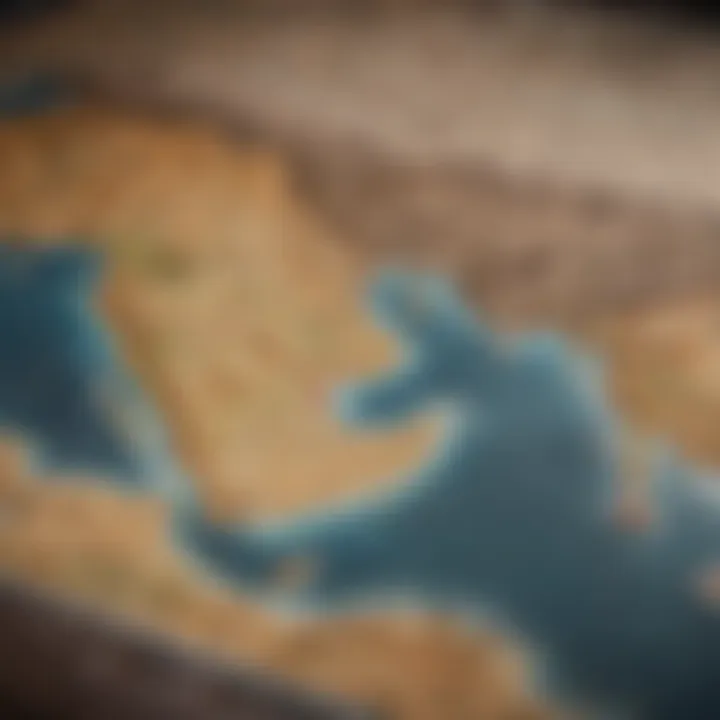Unveiling a Diverse Selection of History Books: An In-Depth Guide to Historical Reading


Book Title and Author Introduction
This section delves into a captivating exploration of a significant history book and its distinguished author. Providing a brief overview of the book's central theme and the author's background allows readers to understand the context of the upcoming discussion. By unraveling the key themes embedded within the book, readers gain a foundational understanding of the profound insights awaiting them.
Summary of Book Content
In this section, a concise summary of the book's core elements is presented, offering readers a sneak peek into the wealth of knowledge awaiting them. Select highlighted quotes or passages serve as poignant reflections of the book's essence, providing a glimpse into the profound narratives and analyses encapsulated within its pages.
Three Lessons Learned
Delving into the book's depth, three essential lessons emerge, each offering invaluable insights into the understanding of history. Through a detailed explanation of each lesson extracted from the book, readers gain a nuanced perspective on the historical events and contexts discussed, enhancing their comprehension and critical thinking skills.
Practical Applications
The practical application section delves into real-life scenarios where the lessons gleaned from the book can be implemented. By providing tips on integrating these lessons into daily life or specific situations, readers are equipped with actionable strategies for utilizing historical knowledge to navigate challenges and make informed decisions.
Introduction to Historical Literature
In this section, we embark on a journey through the realms of historical literature, a realm where the past comes alive through words on paper. Understanding historical literature is crucial as it serves as a gateway to unraveling the complexities of the past. By immersing ourselves in the narratives penned by historians, we gain profound insights into the events and movements that have shaped civilizations and societies over time. Historical literature not only educates but also inspires, instilling a sense of curiosity and critical thinking in the readers.
Understanding the Importance of History
The Role of History in Shaping Societies
Delving into the role of history in shaping societies reveals the intricate interplay between past actions and present outcomes. History serves as a compass guiding societies towards progress or warning them against repeating past mistakes. Understanding historical trends and patterns empowers societies to make informed decisions, fostering cultural heritage preservation and societal development.


Why History is Crucial for Personal Development
Exploring why history is crucial for personal development unveils the transformative power of learning from the past. By studying history, individuals gain a deeper understanding of human nature, resilience, and the consequences of actions. Personal growth thrives on historical insights, offering valuable lessons in empathy, critical thinking, and adaptability.
Exploring Different Themes in History
Political History and Its Impact
Political history delves into the dynamics of power, governance, and decision-making, showcasing how political landscapes evolve and influence societies. Understanding political history provides a lens to analyze leadership styles, governance structures, and the impact of policies on communities. It enables individuals to grasp the intricacies of political movements and ideologies that have shaped nations.
Social and Cultural Evolution Through History
Exploring social and cultural evolution through history unravels the tapestry of human interactions, beliefs, and traditions that have molded societies. Social history delves into the dynamics of community life, social hierarchies, and cultural exchanges, shedding light on how shared experiences shape identities and relationships. Cultural evolution highlights the transformative power of artistic expressions, rituals, and societal norms over time.
Economic History: Lessons from the Past
Economic history provides a retrospective analysis of financial systems, trade routes, and economic policies that have influenced global prosperity. Studying economic history offers insights into the impact of economic decisions on livelihoods, wealth distribution, and industrial development. By learning from past economic challenges and innovations, individuals gain a deeper appreciation for the interconnectedness of economic factors and societal progress.
Recommended Books on History
In this section, we delve into the importance of recommended books on history within the context of this comprehensive guide. These recommended books serve as valuable resources for individuals seeking to delve deeper into various historical themes and periods. By exploring a curated list of books, readers can gain nuanced insights and expand their understanding of the past. The inclusion of recommended books adds a layer of authenticity and credibility to this article, offering readers a structured pathway for further exploration.
Ancient Civilizations and Empires
The Rise and Fall of the Roman Empire
The 'Rise and Fall of the Roman Empire' holds a pivotal place in historical literature, providing a comprehensive account of one of the most influential empires in history. This book intricately explores the political, social, and economic dynamics that shaped the trajectory of the Roman Empire. Readers benefit from a detailed analysis of key events, personalities, and factors contributing to the empire's ascension and eventual decline. The unique feature of this book lies in its ability to draw parallels between ancient and contemporary societal structures, offering readers valuable lessons from history within the context of this article.


Egyptian Civilization: A Historical Overview
'Egyptian Civilization: A Historical Overview' offers readers a profound insight into the rich cultural heritage and technological advancements of ancient Egypt. This book highlights the key characteristic of Egyptian civilization, emphasizing its enduring impact on art, architecture, religion, and governance. By delving into the unique features of Egyptian civilization, readers gain a comprehensive understanding of the societal dynamics that defined this ancient empire. The inclusion of this book in the recommended list enriches the narrative of this article, providing readers with a holistic view of ancient civilizations.
The Persian Empire: Legacy and Impact
Exploring 'The Persian Empire: Legacy and Impact' allows readers to uncover the historical significance of one of the most influential empires in ancient history. This book offers a nuanced perspective on the cultural, political, and military achievements of the Persian Empire, underscoring its enduring legacy in shaping subsequent civilizations. Readers benefit from a detailed exploration of the empire's contributions to trade, governance, and diplomatic relations. By including this book in the recommended list, this article provides readers with a comprehensive understanding of the Persian Empire's complex tapestry and its relevance in modern times.
Medieval Times and Feudal Systems
Knights and Chivalry: A Historical Perspective
'Knights and Chivalry: A Historical Perspective' delves into the romanticized yet intricate world of medieval knighthood and chivalric codes. This book offers readers a glimpse into the valor, honor, and hierarchical structures that defined the medieval knightly order. By highlighting the key characteristic of knights and chivalry, this book provides insights into the ethical dilemmas and moral imperatives faced by knights. The unique feature of this book lies in its exploration of chivalry's evolution across different medieval regions, offering readers a nuanced understanding of this noble tradition within the context of this article.
Feudalism in Europe: Dynamics and Structures
Examining 'Feudalism in Europe: Dynamics and Structures' uncovers the intricate social and economic systems that underpinned medieval European society. This book delves into the hierarchies, obligations, and power structures that characterized feudal relations in the Middle Ages. Readers gain valuable insights into the roles of lords, vassals, and serfs, as well as the impact of feudalism on governance and land distribution. By including this book in the recommended list, this article provides readers with a detailed exploration of feudal dynamics and their enduring impact on European history.
Modern History and World Wars
World War I: Causes and Consequences
An in-depth analysis of 'World War I: Causes and Consequences' offers readers a nuanced perspective on the factors that precipitated one of the most devastating conflicts in modern history. This book delves into the political rivalries, alliances, and technological advancements that contributed to the outbreak of World War I. Readers benefit from a comprehensive examination of the war's aftermath, including its geopolitical repercussions and societal transformations. By including this book in the recommended list, this article provides readers with a detailed narrative of World War I's complexities and lasting legacy.
World War II: A Comprehensive Analysis


'World War II: A Comprehensive Analysis' provides readers with a holistic understanding of the global conflict that reshaped the course of history. This book intricately dissects the causes, key battles, and consequences of World War II, offering readers a nuanced perspective on the war's far-reaching impact. By highlighting the unique features of World War II, this book enables readers to examine different theaters of war, military strategies, and ideological tensions that defined this era. Including this book in the recommended list enriches the narrative of this article, providing readers with a comprehensive overview of World War II.
The Cold War Era: Political Tensions and Resolutions
Exploring 'The Cold War Era: Political Tensions and Resolutions' delves into one of the most pivotal periods in modern history characterized by political rivalries and ideological confrontations. This book offers readers a detailed analysis of the competing superpowers, proxy conflicts, and diplomatic negotiations that defined the Cold War era. Readers gain insights into the strategies, propaganda, and technological advancements that shaped the geopolitical landscape during this period. By including this book in the recommended list, this article provides readers with a comprehensive overview of the Cold War's complexities and its enduring repercussions.
Revolutionary Movements and Independence Struggles
The French Revolution: Impact on Europe
'The French Revolution: Impact on Europe' offers readers a profound insight into one of the most tumultuous periods in European history. This book explores the social, political, and economic factors that spurred the French Revolution and its reverberations across the continent. By highlighting the key characteristic of the French Revolution, this book enables readers to understand the ideals, conflicts, and transformations that marked this revolutionary period. The unique feature of this book lies in its examination of the impact of revolutionary ideologies on subsequent European movements, offering readers a comprehensive narrative within the context of this article.
Gandhi's Nonviolent Resistance: Lessons for Humanity
Delving into 'Gandhi's Nonviolent Resistance: Lessons for Humanity' unveils the philosophy and tactics of one of the most iconic figures in modern history. This book offers readers a deep dive into Gandhi's principles of nonviolent resistance, civil disobedience, and spiritual activism. By highlighting the key characteristic of Gandhi's teachings, this book provides readers with insights into the power of peaceful resistance in challenging oppressive systems. The inclusion of this book in the recommended list enriches the narrative of this article, inspiring readers with Gandhi's enduring legacy and messages of compassion and justice.
Globalization and Contemporary History
The Impact of Technology on Modern History
Exploring 'The Impact of Technology on Modern History' delves into the transformative role of technological advancements in shaping contemporary narratives. This book offers readers a critical analysis of how innovations in communication, transportation, and automation have revolutionized global events and interactions. By highlighting the key characteristic of technological progress, this book enables readers to dissect the impact of digitalization on economies, cultures, and geopolitical dynamics. Including this book in the recommended list enriches the narrative of this article, providing readers with insights into the multifaceted impact of technology on modern historical developments.
Global Politics and Diplomacy in the 21st Century
Examining 'Global Politics and Diplomacy in the 21st Century' offers readers a comprehensive overview of the evolving landscape of international relations. This book delves into the key players, geopolitical challenges, and diplomatic strategies that define the contemporary global arena. Readers gain insights into the role of diplomacy in conflict resolution, climate negotiations, and trade agreements in the 21st century. By including this book in the recommended list, this article provides readers with a nuanced understanding of current geopolitical dynamics and the complexities of diplomatic engagements on a global scale.
Conclusion and Further Exploration
In the final section of this comprehensive guide on exploring books on history, we delve into the critical aspect of concluding our historical narratives and the importance of further exploration. Understanding the relevance of reflecting on historical narratives allows us to draw parallels between the past and present, enabling a deeper comprehension of the continuous impact of history. By considering the implications of historical understanding in today's world, we can grasp the significance of learning from past events to inform present decisions and shape a better future. This introspective process aids in gaining insights into how history influences societies, politics, and human behavior.
Reflecting on the role of individuals in shaping historical events emphasizes the agency and influence of pivotal figures throughout history. Analyzing how individuals have contributed to significant historical moments offers a nuanced perspective on the interconnectedness between personal actions and broader historical currents. Recognizing the impact of individual agency prompts us to reconsider historical narratives from diverse viewpoints, highlighting the multifaceted nature of interpreting past events.
Expanding knowledge through diverse perspectives in historical studies broadens our understanding of the complexities inherent in interpreting the past. Embracing interdisciplinary approaches allows us to integrate insights from various academic disciplines, enriching historical analyses with diverse methodologies and frameworks. Incorporating global perspectives in history illuminates the interconnected nature of human experiences across different regions and cultures, fostering a more comprehensive and inclusive understanding of the historical landscape. By considering diverse viewpoints, we cultivate a more nuanced and informed approach to studying history, appreciating the nuances and complexities that shape our understanding of the past.







